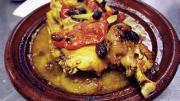At the rightly named Moroccan Hospitality, sisters Nouzha Ghalley and Amina Ghalley McTursh make almost everything from scratch. Traditional chicken bastilla ($5.99) is served as an appetizer, but the bundling of tastes—from cinnamon, crushed almonds, and eggs to a splash of rose water—is bold. The buttery phyllo-wrapped beef “cigars” ($3.99) hold flecks of onion, orange peel, and cilantro. Tenderly fried potato cakes ($3.99) are laced with garlic; use caution spooning on the creamy hot chili paste (harissa). For entrées, try the chicken tfaya ($13.50), roast poultry on the bone topped with a sweet and spicy mélange of caramelized onions and raisins; or a range of tagines (stews, slow-cooked in clay pots). The lamb stew has green olives and honey, while potatoes, carrots, peas, artichokes, and onions pack the vegetable version ($11.99), spiked with preserved lemon. Piles of feathery couscous with golden raisins come on the side. Last year the restaurant migrated from its original storefront in Malden to Somerville. The new environs are a healthy walk from Cambridge’s Porter Square, and offer welcome refinements: orange- and crimson-colored walls, banquettes with soft pillows, white tablecloths, and candlelight.
Homecooked Moroccan fare in Somerville
Homecooked Moroccan fare in Somerville
Moroccan Hospitality lives up to its name.


You might also like
Eating for the Holidays, the Planet, and Your Heart
“Sustainable eating,” and healthy recipes you can prepare for the holidays.
Best Bars for Seasonal Drinks and Snacks in Greater Boston
Gathering spots that warm and delight us
Sustainability on the Menu
Harvard’s sustainable meals program aims to support local farms, protect oceans, and limit waste.
Most popular
Explore More From Current Issue

How a Harvard Hockey Legend Became a Needlepoint Artist
Joe Bertagna’s retirement project recreates figures from Boston sports history.

At Harvard’s Beck-Warren House, Ghosts Speak Many Languages
The quirky 1833 home now hosts Celtic scholars.






